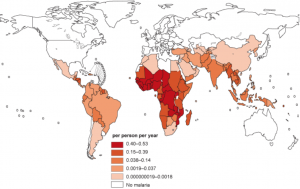QUESTION:
How many days will the fever last?
ANSWER:
There is no set amount of time for the duration of a malaria fever, and in fact it will depends on several factors, namely the type of malaria the patient has, their level of acquired immunity, whether they were taking preventative medicine for malaria (prophylaxis) at the time of infection and how quickly they receive appropriate treatment.
There are, however, known “cycles” to the progression of fever during a malaria infection. Plasmodium falciparum, P. vivax and P. ovale, three of the types of malaria that normally infect humans, are known as “tertian” malarias, as they produce fevers that peak every two days. P. falciparum, due to its severity and rapid increase in the human host, can sometimes present with more frequent, or even constant, fever. P. malariae, on the other hand, is considered a “quartan” malaria, as it produces fever in approximately three-day cycles.
